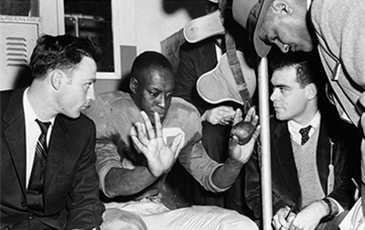





Excerpt from oral history interview with Bobby Grier
June 18, 2014
by Mark Cave, interviewer; Thomas Walsh, producer
The Historic New Orleans Collection, 2014.0318.1
Grier discusses the controversy surrounding his participation in the Sugar Bowl, and how he was treated in New Orleans.
Image: Bobby Grier in locker room; January 1, 1956; The Historic New Orleans Collection, gift of the Sugar Bowl, 2007.0208.56
Bobby Grier: It makes you feel kind of strange, why would somebody be like that? This is football, you know. We don’t care about that. We go out there and play against each other, bump heads. We’re knocking each other down and everything, reach your hand and pick you up. We couldn’t quite understand what it was. We didn’t think about it as politics, you know, like it is now, you know. Back then, we didn’t think about that.
[“Cast Your Fate to the Wind” by Allen Toussaint plays.]
Back then there weren’t that many bowls, maybe, what, five or six or seven bowls. Got a chance to go to one of the big bowls, so—not afraid at all. Just, all I wanted to do is play football.
[“Cast Your Fate to the Wind” plays.]
The governor of Georgia made a stink and the students rioted and everything. And the team, my teammates voted and said if I don’t go, they don’t go. Back then there was something like what, maybe twelve pro teams, and we’re all seniors. And I said, “This’ll be their last chance and our last chance.” And I didn’t want to hinder any of them. I said, “If push come to shove, I’ll stay home.” It wouldn’t bother me at all, just so they could play.
[“Cast Your Fate to the Wind” plays.]
When we played down South, we were separated. The black players stayed at a black college or a motel that was close. And when we went down South, we didn’t mind because we had a ball. We had no curfew or anything on us. The other players, the white players, had strict curfew and everything, but we were in a black neighborhood, in a black area, and we knew coaches wasn’t going to come down and check on us or anything, so we generally had a good time. We stayed up later.
[“Cast Your Fate to the Wind” plays.]
I was at Kappa Alpha Psi fraternity, and I knew I couldn’t go to the regular festivities they had and everything, so the black colleges down there made sure I had a party and everything to go to.
[“Cast Your Fate to the Wind” plays.]
The Georgia players were great. Like I say, I don’t know how many were from the South or from the North, but all of them were great. They’d tackle me and everything and help me up off the ground. True sportsmen, that’s what it was.
[“Cast Your Fate to the Wind” plays.]
I got letters and things from people all over the country, all over the world, praising me and telling me, “Stick in there.” So it encouraged me to—people saying, “No, hey, let’s get rid of this segregation stuff and everything.” Especially in sports, they want the best players out there playing the game on their team. It came along slowly, but it’s more or less in now.
[“Cast Your Fate to the Wind” plays.]
That’s what people want. The only trouble is, they wish they could get that in regular life.
[“Cast Your Fate to the Wind” plays.]